AudioCulture
The noisy library of New Zealand music
Te pātaka korihi o ngā puoro o Aotearoa
Jay Clarkson
aka They Were Expendable, The Expendables, Breathing Cage
A prolific songwriter who time and time again found the players to bring her music out in bands They Were Expendable, The Expendables, Breathing Cage, The Matches and solo, Clarkson’s songs are still revealing their worth over 30 years on.
“Her music washes over you cool and clear as the proverbial mountain spring. It’s mood music, un-hooky, uncluttered, accentuated rather than driven by rhythms. Guitar (acoustic and electric) is highlighted here and there by snatches of sax and electric organ, but Jay’s voice carries the songs,” RipItUp’s Donna Yuzwalk wrote in February 1993, following the release of Clarkson’s early career compilation Packet for Flying Nun Records.
“Her style is both withheld and personal, as if she’s singing the kind of thoughts you don’t voice when you meet someone for the first or last time.”
Clarkson’s fourth group, Breathing Cage, won the third Rheineck Rock Award in 1989.
Clarkson’s fourth group, Breathing Cage, won the third Rheineck Rock Award in 1989 with its generous prize to record a studio album. Controversy and jealousy soon flared. She wasn’t commercial or accessible enough, some said. With band members spread out between several cities, it’d be two long years before Breathing Cage’s accomplished Misericord appeared on Auckland’s Tall Poppy Records in late 1991.
Taking time out to write fiction, another ongoing passion, and now resident in Dunedin, Jay Clarkson pressed on through the decade into the 2000s with backing groups that included The Matches, who toured the 2007 Over The Mountain album released through Auckland’s Arch Hill Records.
Jay Clarkson featured in Ian Chapman’s 2010 book Kiwi Rock Chicks, Pop Stars and Trailblazers, a collection of women’s music history tales, and while not touring often is still playing, albeit mostly solo.
Coloured
The Christchurch singer, guitarist and songwriter first came to notice in The Playthings. Old-guard rockers inspired – but not wholly convinced – by punk, they released independent singles in 1981 and 1982, and a posthumous live album on Flying Nun Records in 1986.
With a young son to consider, Jay Clarkson was reluctant at first to join, but settled in on bass and vocals then guitar in the busy group, who were regular faces at Christchurch’s post-punk friendly DB Gladstone and Star & Garter.
The Playthings – Clarkson (bass, vocals), Dave Toland (drums), Nicky Carter (guitar, sax, vocals), Janine Saundercock (guitar, vocals) – played Gladstone one-offs in October and December 1980 with two more double-night runs there with The Yo Yo’s then The Gordons in January 1981. In early February 1981 The Playthings shifted across town to the larger Hillsborough with The Androidss.
A pattern soon developed where they would regularly headline three nights at The Gladstone, as they did in March and May 1981, sprinkled with nights elsewhere as opportunity arose.
Luckily the third of the May Gladstone dates was captured on tape by manager and soundman Paul Kean (Toy Love, The Bats) and would eventually appear as a raw live album on Flying Nun Records in 1986. Clarkson’s songs ‘Coloured,’ ‘Reception’ and ‘Justified’ stood out in the mix.
In July 1981 ‘Coloured’ was plucked from the live tape with Saundercock’s ‘Sit Down (Stand Up)’ for a promising independent single that edged into the NZ Singles Chart for one week at No.41. A copy found its way to English DJ John Peel, who spun it on his influential Radio One show.
“Coloured’ and ‘Stand Up’ were typically hard and strident pop, in a similar vein to mid period Toy Love, and included a brash bass sound a la Paul Kean (which was understandable, given Jay Clarkson was using his distinctive homemade bass by this time),” Wade Churton wrote in the comprehensive Have You Checked The Children? – Punk and Post Punk Music In New Zealand 1977-1981 (2001).
“There was also a Droppa Kulcha video made for ‘Coloured’ featuring the band’s recently-acquired stage props; giant toy blocks which spelled out their name.”
The Playthings stepped onstage at the Sunday’s Kool concert at Christchurch Town Hall in early August with a new bass player, Paul Kean. Janine Saundercock had departed prompting Jay Clarkson’s shift to guitar. There would now be fewer covers and more Clarkson originals in the set.
The new Playthings line-up headed to The Gladstone for three more nights in August and another three in September. There were yet more shows with The Androidss and The Newtones at The Gladstone in late October followed by three mid-November shows at new Christchurch indie hangout the Star & Garter. Two shows with The Stones in Dunedin’s Empire on November 27 and 28 rounded out the month.
Firmly established as a Garden City live draw, The Playthings saw 1981 out and 1982 in at The Gladstone before shifting to the Star & Garter in mid-February with The Volkswagens.
In early March 1982 they joined Mainly Spaniards, The Clients and Desperate Measures for Speed All Night at University of Canterbury. But by the time The Playthings second single ‘Bird’s Eye View’ b/w ‘ Pure Frost’ (both Clarkson originals) and Paul Kean’s ‘Dumb’ dropped in mid-May 1982, the band had split.
Putting the eye
Retaining Dave Toland, Jay Clarkson tapped Mainly Spaniards’ Nick Strong for bass and guitar and Donna Sheen for additional vocals and percussion to fill out her next group, They Were Expendable (briefly known as Dodgems).
The new quartet joined The Chance and Scorched Earth Policy at the Star & Garter on October 22 and 23, 1982 then headed south to The Pitz in Dunedin for November 12 and 13 shows.
They Were Expendable started 1983 as they meant to go on with seven nights at The Gladstone (with Not Really Anything and The Stones), before hitting the highway north with NRA for a spot at the Sweetwaters festival just south of Auckland at Pukekawa.
After three early February nights with Fetus Productions and Not Really Anything at Auckland’s Rumba Bar, the new group put their QEII Arts Council grant to good use with Doug Hood and Terry King at Progressive Studios. Five new Clarkson songs and Nick Strong’s ‘Posture’ were captured for release on Flying Nun Records.
Not Really Anything and They Were Expendable ended their wide-ranging national tour at the Star & Garter on February 25.
When RipItUp compiled a scene report called "Life In The Garden – Pressed Flowers & New Roses" for its March 1983 issue, They Were Expendable featured alongside The Chance, Tony Peake’s Yen, Mainly Spaniards, Roger Shepherd, promoter Jim Wilson, Bill Direen, Ballon D’Essai, The Wastrels and The World.
Early the following month, the Christchurch quartet lined up with the cream of New Zealand’s rising post-punk groups at Punakaiki Festival near Greymouth before returning to Dunedin for three nights at The Empire with old pals Not Really Anything.
“TWE were in unrelenting form. With each member making maximum contribution they tore through a set of tight intelligent originals into a well-deserved encore,” RipItUp reported of the festival appearance.
In May, the band was back in Auckland at the Rumba Bar.
June was even busier. They Were Expendable partnered with The Clients at the Gladstone before the pair shifted to the Hillsborough with Not Really Anything for two evenings. A return Hillsborough show on June 24 had them on a bill with The Bats and regular partners NRA.
The following day TWE was one of a diverse line-up at The Gladstone for Radio U’s Telethon fundraiser with Evasive Action, Kiwi Animal, Ballon D’Essai and Not Really Anything. In July, Scorched Earth Policy and Art & Duty joined Clarkson’s post-punk quartet at The Gladstone.
Indie Christchurch
Christchurch’s post-punk scene flared to life in 1983 after a relatively quiet 1982. The sheer diversity of the new sounds in the city that year was on show in late July and early August at the DB Gladstone’s War of the Bands.
They Were Expendable went through to the semi-finals alongside The Triffids, YFC, My Three Sons and Discovery Class on August 5. With The Triffids, TWE advanced to the finals the following evening, where they joined The Venetians, Sleeping Gas and eventual winners, Mark Brooks’ The White Boys.
Soul, funk, electro-pop, new punk and oi, folk rock and teenybopper pop, Christchurch tried them all on for size that year. Three key venues, The Gladstone, Star & Garter and Hillsborough – with rooms such as Doodles, The Zoo Room and Caledonian Hall – featured groups playing original music.
From the city’s robust new punk scene came E.C.F and Evasive Action. Funk of sorts arrived with The Haemogoblins, the Orange Juice-ish The World and The Triffids, and upbeat guitar pop was offered up through Dance Exponents and The Wastrels. There were art rockers They Were Expendable and Not Really Anything, folk rock from The Bats and Mainly Spaniards, and barer, less orthodox post-punk sounds from Ballon D’Essai and YFC.
Bill Direen’s Above Ground, Jon Segovia’s The Chance and The White Boys showed the older guys were still cutting it. Future Metro editor Bevan Rapson and Flying Nun act Peter Arnold had My Three Sons. Future punk historian Wade Churton played guitar in The McGoohans and Scorched Earth Policy stumped up a dark garage rock. The Bottletops chipped in an eclectic mix of sound and voice.
Christchurch remained a sizeable market for touring New Zealand groups. In 1983 Auckland sent down Herbs, The Mockers, The Dabs, The Gurlz, Export Lamb, Marginal Era, Children’s Hour, No Tag and Kiwi Animal.
Dunedin’s Netherworld Dancing Toys (described as “Dunedin’s Midnight Runners”), The Stones, Stormbringer and Doublehappys made the trip north. Wellingtonians Naked Spots Dance, First Fifteen, The Spines, The Body Electric, Mole Manne, Primitive Art Group and Unrestful Movements all had records out when they played in Christchurch.
Provincial mavericks Say Yes To Apes and Nocturnal Projections came to town. From further afield, John Cale, The Birthday Party, John Cooper Clarke and The Troggs arrived. The Gordons (minus Alister Parker), The Marching Girls, The Screaming Meemees and Tall Dwarfs all played must-see shows in Christchurch that year.
Not content with local success, They Were Expendable sought out the national post-punk community in August with NRA. Two nights at Cosgroves in Wellington was chased by shows at Auckland’s Mainstreet, De Bretts and the Windsor Castle.
They Were Expendable’s Big Strain EP hit the record shops in September, highlighted by a simple, well shot video of the title track that captured both an alluring song and the group well.
Inbetween gears
Back home in Christchurch in December, Flying Nun Records’ all day recording party showcased Say Yes To Apes, AXEMEN, NRA, The Haemogoblins, Double Happys, Scorched Earth Policy, The Expendables, Children’s Hour and The Bats.
In late 1983, Dave Toland, Donna Sheen and Nick Strong departed They Were Expendable. Jay Clarkson replaced them with Michael Kime (bass) and drummer Robert Key (who played that role in NRA as well) and named the new line-up The Expendables.
The Christchurch trio was one of four bands to embark on February and March 1984’s Looney Tours Roadshow, along with Children’s Hour, Double Happys and The Chills.
The Christchurch trio was one of four bands to embark on February and March 1984’s Looney Tours Roadshow, along with Children’s Hour, Double Happys and The Chills. The ground-breaking indie excursion took the Flying Nun groups to all the main centres and plenty of smaller locales.
The Expendables returned to Oamaru and Dunedin’s Oriental Tavern in mid-July. In late August and early September 1984 they were back at The Windsor Castle before heading across town for a mid-month slot at The Gluepot.
The new trio took time out to record their first single, ‘The Flower’ b/w ‘Man With No Desire’ at The Lab for November release with soundman Rex Visible producing and adding a guitar solo.
February 1985 found The Expendables out on the road. A new line-up with Chris Matthews drumming and Anthony Nevison (55 Polish Workers, Grocer Man Jack) on guitar joined Kime and Clarkson for a South Island tour in early May with This Kind Of Punishment, taking in Ashburton, Timaru, the Gladstone (twice) and Dunedin’s Oriental. Jay Clarkson had originally intended to just sing in her new group, but found she liked the sound of two guitars and was now playing the six-string as much as ever.
It was a strong empathic double bill that had Chris Matthews drumming in both groups. TKP’s Peter and Graeme Jefferies were also soon linking up with Clarkson for future projects.
Inbetween Gears, The Expendables’ second release in June 1985, was an eight song EP recorded mostly at Progressive Studios with Rex Visible and Terry King. It was the Kime, Key and Clarkson line-up, with Mike Russell on horn for one track.
Clarkson was now residing in Auckland and she spoke to Fiona Rae for her first full feature in RipItUp, where the contrast with her early days was plumbed. She felt more emotive and present as a singer, less bitsy and simpler as a songwriter..It was easier to concentrate on guitar if the songs were simple.
With a full road crew of Rex Visible (sound), Craig Mason (lights) and Dave Wishart (van), The Expendables were out again in early September 1985. That motley crew parked the van outside the Windsor Castle for two evenings with This Boy Rob.
Looking to get some of her still growing catalogue down, Jay Clarkson prepared a solo album utilising Chris Matthews, Wayne Baird, Peter Allison (The Chills) and more extensively Peter Jefferies.
Jefferies contributed piano to ‘A Loose End’, ‘Penelope’ and ‘Gone’ for the self-titled Jay Clarkson album that contained one of Clarkson’s best and most well known songs, ‘The Boy With The Sad Hands’. bFM compilation Outnumbered By Sheep mopped up a stray Expendables track, ‘Liberal Cad’, that year as well.
Breathing Cage
At home in Christchurch, Jay Clarkson assembled a new group she named Breathing Cage. Michael Kime was still there on bass with JPS Experience’s Gary Sullivan sitting in on drums and Maria Chiaroni on keyboards. Former Nocturnal Projections and TKP guitarist Graeme Jefferies joined on guitar.
Breathing Cage breathed life back into Clarkson, who’d been struggling to write new songs. The new quartet headed to Auckland in July 1987 at The Gluepot, Windsor Castle and new venue the City Hotel.
Maria Chiaroni departed in September after a night at the Old Star Tavern. Clarkson would miss her. She enjoyed having a friend and woman in the band, she told Paul McKessar in RipItUp, before explaining her musical chemistry with long time bass player Michael Kime.
“Michael and I have developed a good rapport, real empathy. He’s quite plugged into my style of song writing, and with his bass playing, it’s nice to have someone who’s capable of playing both complex and simple, solid stuff.”
For all their complex grace, sylph ducks and dives, and allusive lyrics, Clarkson’s songs typically came to her in half an hour or an hour. She rarely picked up a guitar unless it was to write and even then something dramatic had to happen in her personal life first.
By 1989 Jay Clarkson had written and demoed a full set of mostly new songs that would impress the judges of the prestigious Rheineck Rock Awards, enough to take out the contest’s substantial prize and surprise many in the music world, who thought her work was un-commercial. No such ructions had accompanied Ardijah’s win in 1988 although Headless Chickens’ success in 1987 had prompted a few squawks.
“We did get flak, but my reaction was always, ‘Hey listen, give us a chance. Listen to the record before you decide we shouldn’t have won,’” Clarkson told Adrienne Rewi in NZ Listener on March 16, 1992.
“When you have over two hundred different styles of bands competing against each other there is bound to be dissention. Competitions are not constructive to the industry in that sense and while Rheineck’s subsequent sponsorship withdrawal was a definite loss the QE II Arts Council grants system is a much fairer way of distributing funds.”
The new Breathing Cage had Greg Malcolm-Boelee (Three Leaning Men) on guitar, Graeme Jefferies having shifted to Auckland for the next phase of his creative life. With three band members residing in Christchurch and one in Auckland, it would be over two years before Misericord was completed in Auckland’s Airforce Studios with Nick Morgan producing.
In the meantime Breathing Cage continued to play out. In mid-May 1989 the quartet joined The Clean and Chris Knox at The Powerstation in Auckland. September found them on the same stage as The Bats and Bailter Space in Christchurch’s Horticultural Hall at a fundraiser for financially ailing University of Canterbury student radio station UFM. The following month, Breathing Cage joined Bailter Space for two shows in Sydney.
Clarkson’s band was one of a strong line-up assembled by writer John Dix under The Best of Flying Nun banner for a Carlaw Park (the former home of Auckland Rugby League) showcase to celebrate New Zealand music and Dix’s pioneering NZ music history Stranded In Paradise. Poor ticket sales saw the shows cancelled. The other acts billed that night were The Bats, Bill Direen, Chris Knox, The Clean, Headless Chickens, JPS Experience, Straitjacket Fits, Tall Dwarfs and The Verlaines with special guest Martin Phillipps.
Misericord
Misericord (pronounced miz-eri-cord, she’d first heard the word in a Graeme Jefferies lyric) was controversial from the name on in. “I like the way it sounds,” Clarkson told Rewi in March 1992. “It can represent mercy and compassion, or a break in the monastic rule – and life is like a monastery with all its rules. Music can supply the opposite – a chance to sit back and drop your guard. When I’m criticised I’m often called a misery guts, so it’s a nice little analogy all round.”
The new album had Justin Harwood guesting on single ‘Memory Lane’, JPSE’s Dave Yetton on ‘Big Life’, some Graeme Humphries piano on ‘Lucille’ with Russell Hoffman providing keyboards on six tracks. Clarkson was well pleased with what they made.
“I think Misericord is of an international standard recording-wise and song wise. It’s got enough bite for the cynics, enough beauty for people who want to be soothed by music, and enough edge to the actual structures to satisfy an intellectual appreciation.”
Breathing Cage had already toured the songs in the South Island in November 1991 and was now due around the North Island in late March 1992.
When Flying Nun Records refused to pick up the album’s studio cost overrun, the Airforce Studios related Tall Poppy Records added the record to their catalogue for New Zealand release. When the new album was reviewed by RipItUp, Misericord’s revisit of ‘The Man With No Desire’ found favour. “At its heart [it is] classic Christchurch melancholy captured for a change, in full bloom, rather than small room.”
Early Misericord demos originally captured between 1987 and 1989, together with two songs recorded in 1985 with Graeme Jefferies, were dusted down for CD release by Failsafe Records in 2006 as Spilt Milk.
There’d also been a stray Flying Nun Records cassingle ‘You & Me & The Old Hill’ in 1991. “Spidery number greatly enhanced by spooky violin sounds scraping away in the background,” was how Donna Yuzwalk described the song in RipItUp. “I can see Jay Clarkson draped in black lace picking her way through a haunted forest while intoning these mysterious lines, although something persistently reasonable in her modulation suggests she’s more likely to be found at home in Dunedin with a cup of tea and sociology text.”
With Gary Sullivan’s duties in JPSE pressing, first Dave Deakin, then Shane Bollingford joined Breathing Cage on drums. Michael Kime departed and was replaced by Mark Howe on bass.
Packet
It all went quiet for a while there as Jay Clarkson returned to her fiction writing. In 1993 Flying Nun Records gathered up her early tracks for Packet and pressed mainstream critic Colin Hogg for the liner notes. Then Music In New Zealand, the William Dart edited music history journal asked Fiona Rae to interview Jay Clarkson for its spring 1993 Suffrage Year issue.
What resulted was one of the most revealing interviews the singer, songwriter and guitarist had given. Jay Clarkson’s current sate of mind is revealed. “I’m just not feeling inclined to express myself through songs at the moment and I feel that if I do start writing music again there’s a possibility I won’t use vocals. I’ve been listening to a lot of classical music and I’m interested in using all sorts of instruments. But nothing’s definite in my mind at all.”
She’d only recently returned to live performance for a couple of festival performances after 18 months of not playing live.
Opening up about her songwriting, Clarkson explained. “I don’t feel guilty about not representing the more light hearted side of things, because I think in the course of day to day life feelings tend to get played down – necessarily so.
“I definitely use chords and notes to say things. If I pick a thirteenth or a ninth or I invent a chord that’s got a very unresolved sound to it, that’s definitely representing an emotion even if I’m not quite sure what the hell it is, it’s really something I feel.”
Regrets? There’d been a few. “I don’t think I’ve pushed myself enough. I’ve never had a manager. It’s just that I never really got hold of the business side of things. I don’t mean if I had a good manager, I would have necessarily been a big name, this is New Zealand for a start and there aren’t that many unusual-type bands that can occupy the space.”
And as for being “underrated”? “Maybe it’s another way of saying that my music’s not that weird, that if people were exposed it enough it could appeal to the mainstream. I’m not sure really.”
Kindle
When Jay Clarkson’s fans heard her music in the mid to late 1990s, it was most likely on compilations. She had ‘Crying’ with The Bats’ Kaye Woodward on Flying Nun Records’ women’s collection Shrew’d in 1993; ‘Fool’ on Trinder’s Does It Float in 1994; ‘Skinned’ on IMD’s Disturbed: A Dunedin Compilation (1995); ‘At The Mercy of’ on Arclife’s Music Of Dunedin (1998); and ‘Flying’ with Suka’s Tenzin Mullen, HDU’s Dino Karlis and Peter Hobbs and ‘Shiver’ with John White on Flying Way Too High in 2000.
Arclife was the home of Jay Clarkson’s next solo album, Kindle (1999), an intimate nine song CD recorded on 4-track. Two years on Clarkson signed up to participate in the Music Industry Commission Mentors in Schools programme.
It was six more years before another Jay Clarkson album appeared. The November 2007 Over The Mountain collaboration with Johannes Contag (Cloudboy, Mink), who helped to mix Kindle.
Demos recorded by the pair in East Berlin in 2004 were expanded further in an idyllic setting in the Austrian Alps. Over The Mountain was then partially finished remotely with Clarkson back in Dunedin and Contag in Berlin. Five more songs were completed and added on Contag’s move to Wellington in 2006 and mixing was completed in the middle of 2007. Arch Hill Records picked up the record for release.
New record. New band. Clarkson gathered up The Matches with Contag on guitar and keyboards, David Hall on bass and Justin Barr on drums.
Jay Clarkson and The Matches promoted the new record in late November and early December at Mighty Mighty in Wellington, The Dogs Bollix in Auckland, Dux De Lux in Christchurch, Circadian Rhythms in Dunedin and The Grainstore in Oamaru. Album contributors Jeff Henderson (clarinet) and Rosie Langabeer (accordion) guested at live shows in Wellington, and John White (violin) and Isaac Smith (double bass) did the same in Christchurch.
Fiction and music continued to spring from Clarkson’s pen and guitar in the years that followed. She was a guest on Sandra Bell’s White Nights CD and was one of Phantom Billstickers’ Kiwi Poets In New York in late February 2012. Her fiction writing has been published in Landfall and online. In 2015 Jay Clarkson released Spur on the independent Zelle label.
Clarkson reunited with the original members of Breathing Cage in January 2017, to perform in Auckland and Christchurch, with an emphasis on the songs from Misericord.
--
Further reading: Jay Clarkson: Rise and Shine, 2023
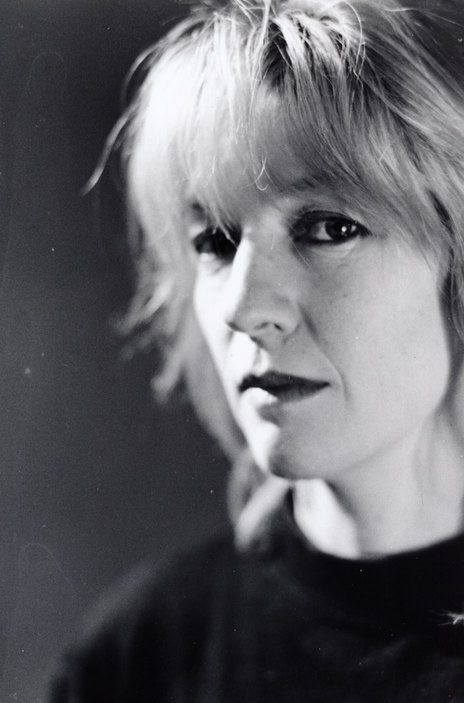
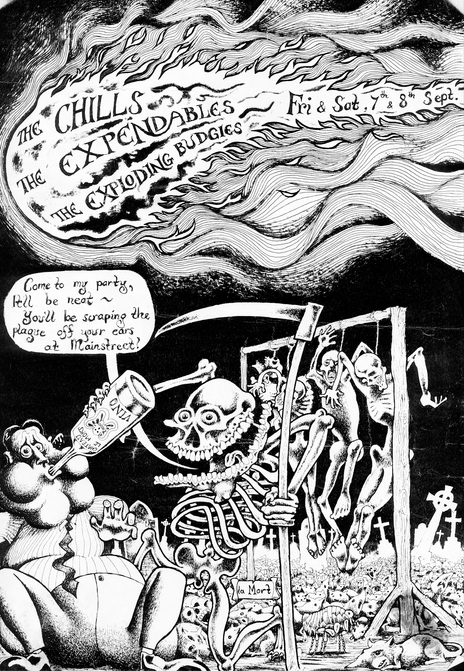
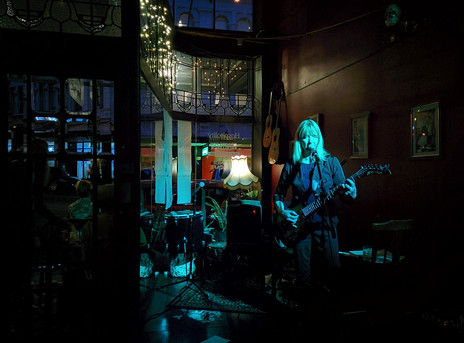
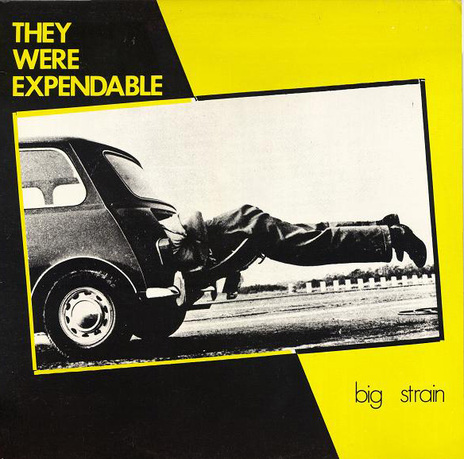
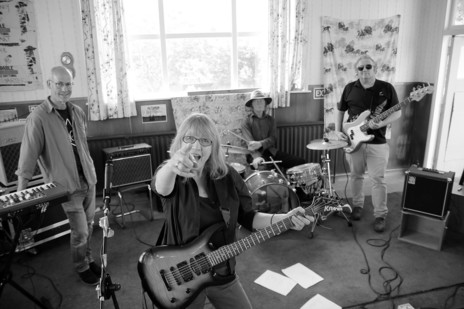
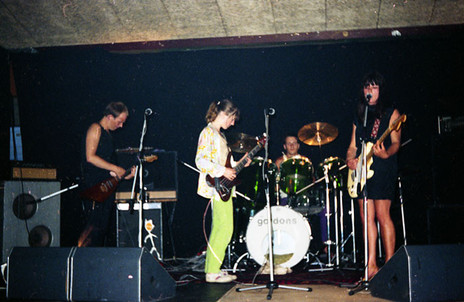
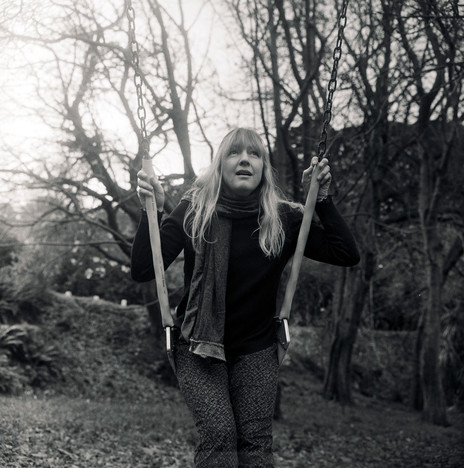
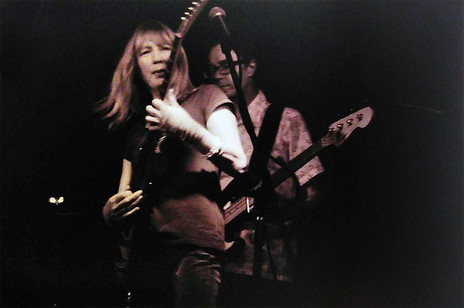
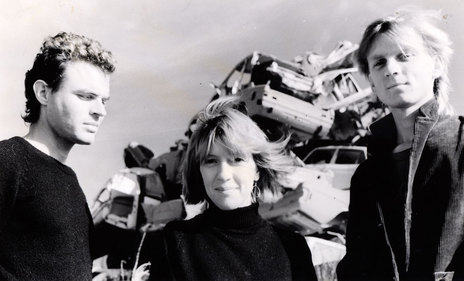
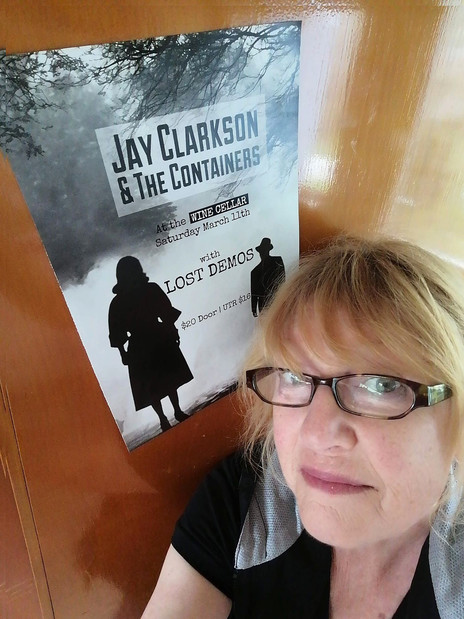
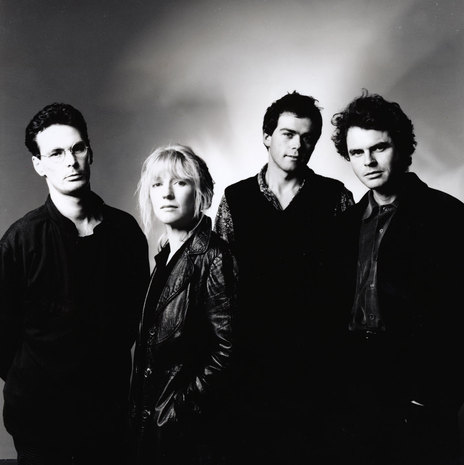
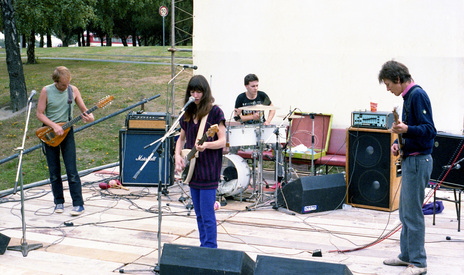
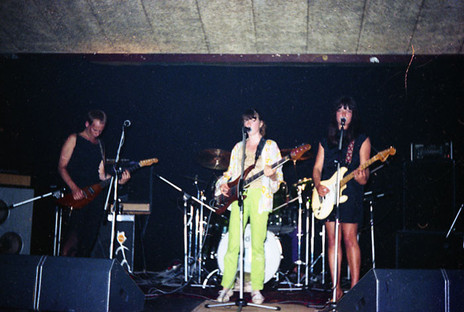
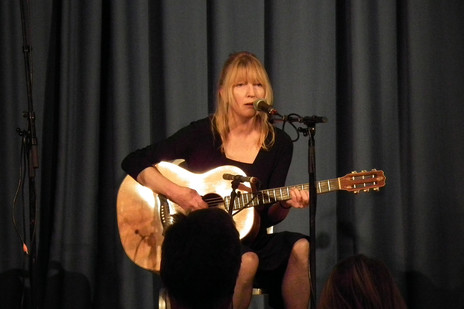
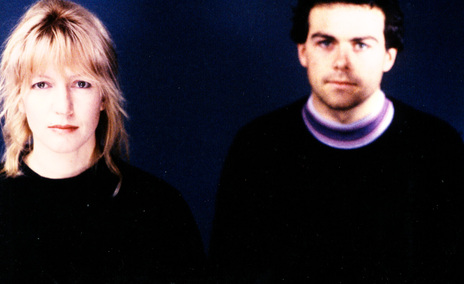
Nick Strong - guitar, bass
Robert Key - drums
Chris Matthews - drums
Graeme Jefferies - guitar
Gary Sullivan - drums
Michael Kime - bass
Johannes Contag - bass, vocals
Justin Barr - bass
Janine Saundercock - vocals
Dave Toland - drums
Nick Carter - guitar
Donna Sheene - vocals, percussion
Russell Hoffman - keyboards
Jay Clarkson - vocals
Visit our sister site
NZ On ScreenMade with funding from
NZ On Air




